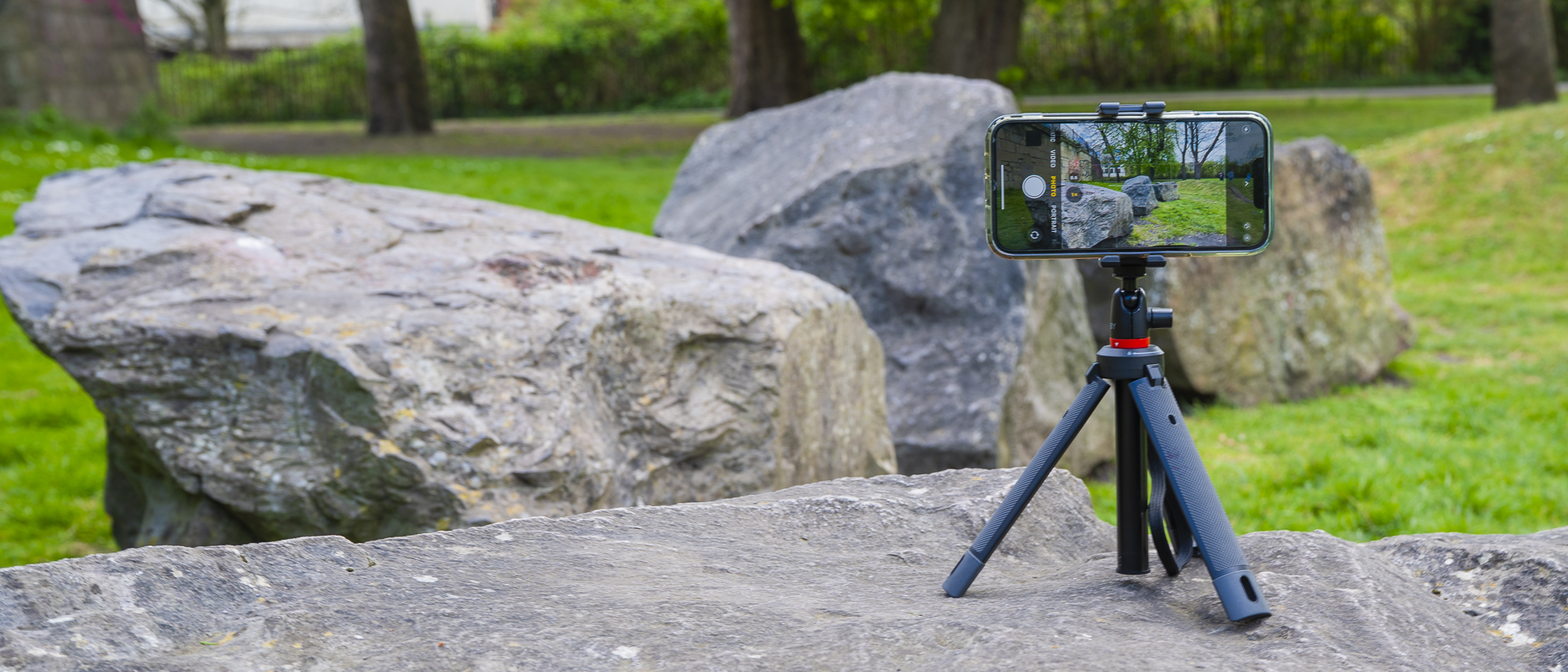The best large format printer for photographers, exhibitors and studios
Discover the best large format printers available, from desktop options to roll-fed commercial printers
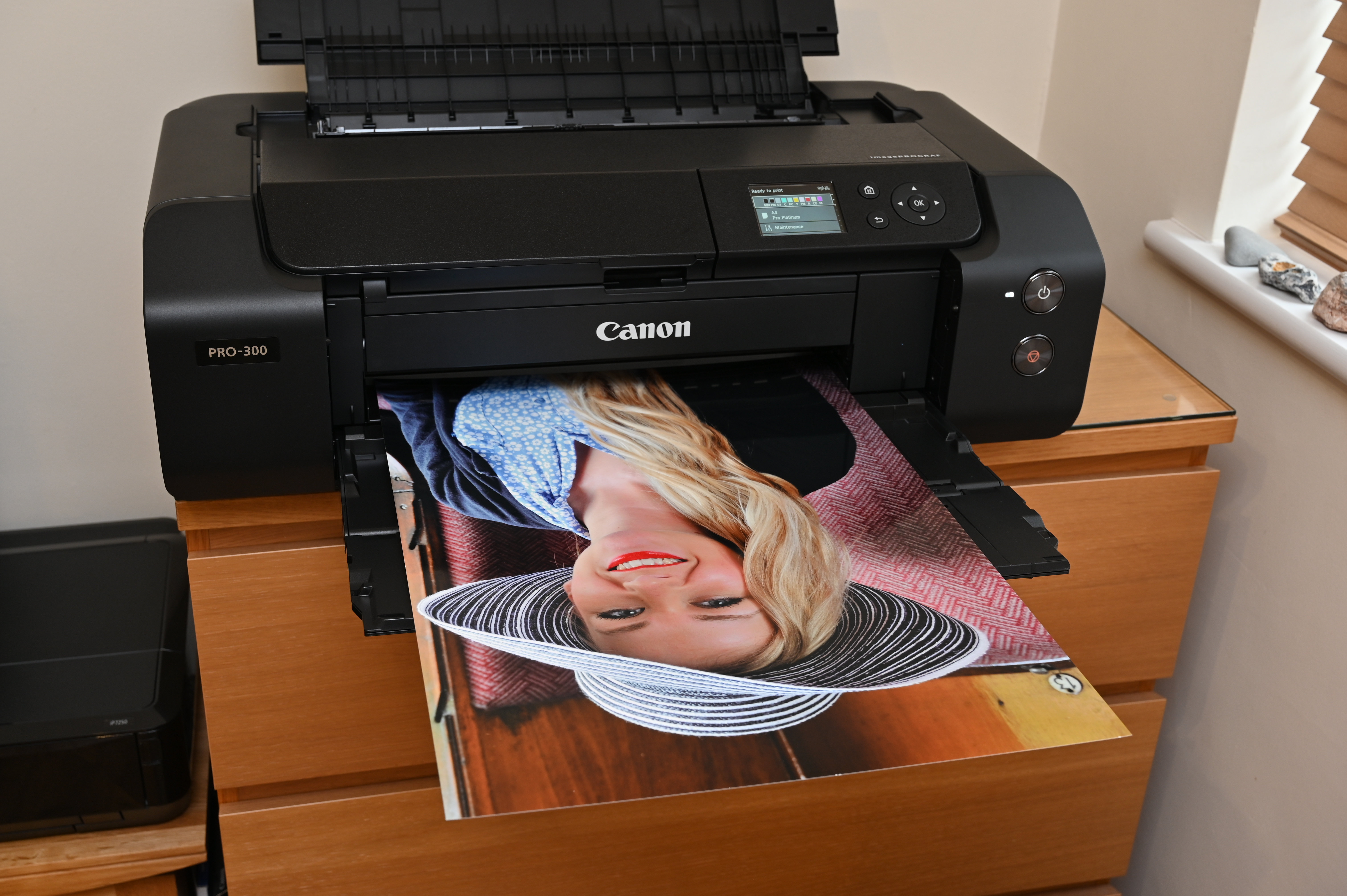
The best large format printers allow us to take advantage of the resolution of today's best professional digital cameras to print images up to billboard size, something that was once only possible for professionals who were able to spend eye-watering amounts on a large-format camera.
The size of large format printers can vary from desktop 13-inch printers (A3+ in Europe) to 17-inch (A2+) roll printers and larger for increased flexibility in size and potentially a greater volume of prints. We've reviewed a wide range of options to pick out the best large format printer for different needs and budgets, evaluating print quality and costs, speed, and volume.
If you're not looking to print at such large sizes, you might want to see our guides to the best photo printers and the best all-in-one printers.

Matthew Richards is a photographer and journalist who has spent years using and reviewing all manner of photo gear. He is Digital Camera World's principal printer reviewer – and has experience of using all the printers on this list. His expertise with equipment doesn’t end there, though. He is also an encyclopedia when it comes to all manner of cameras, camera holsters and bags, flashguns, tripods and heads, printers, papers, and inks, and just about anything imaging-related.
The Quick list
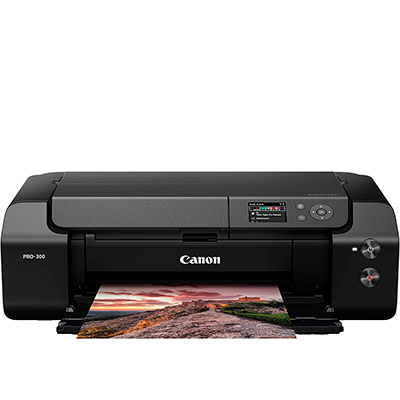
We find that this desktop A3+ printer provides excellent output quality with superb accuracy for color prints and fabulous definition for black & white, without any unwanted color casts.
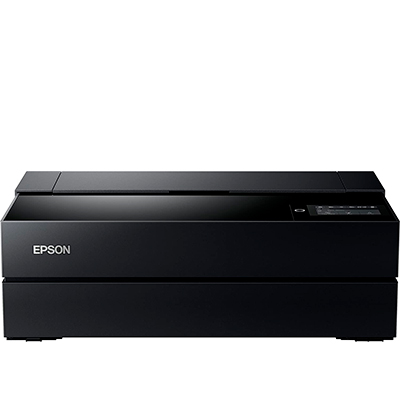
This has a relatively compact footprint for a printer that can handle up to A2 (17 inches) prints, and it's well priced too. We found it produced deep, contrasty blacks and rich tones.
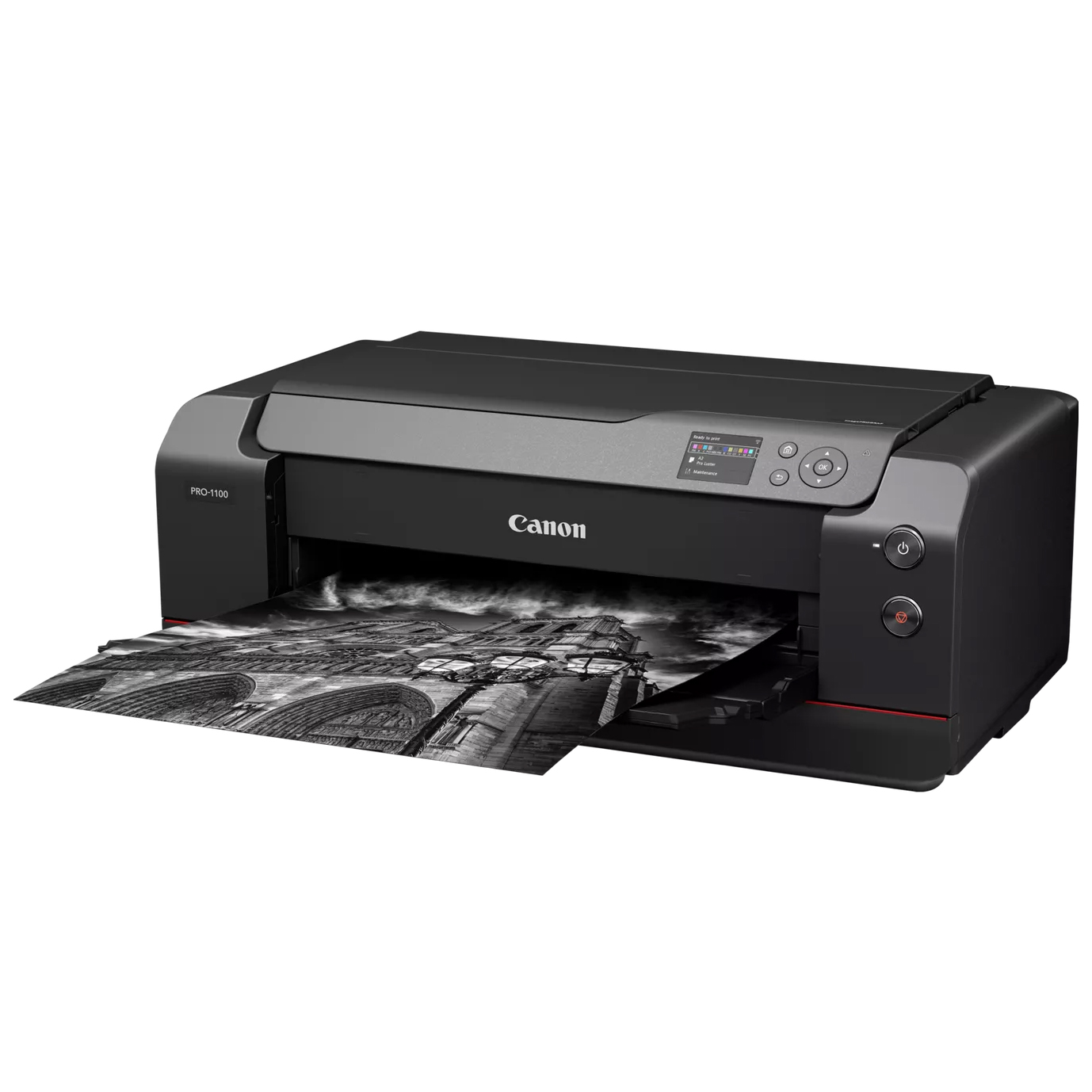
We found that this 12-ink pro option produces outstanding color and mono quality on matte and fine art media, while a chroma optimizer helps minimise bronzing on glossy photo paper.
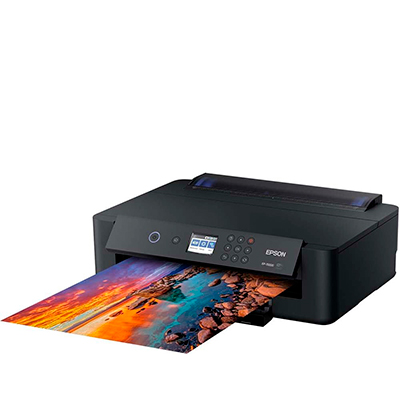
With only six inks, this entry-level 13-inch printer doesn't reproduce colors with quite such accuracy, but it offers reliable A3 printing at a very attractive price, making it ideal for beginners.
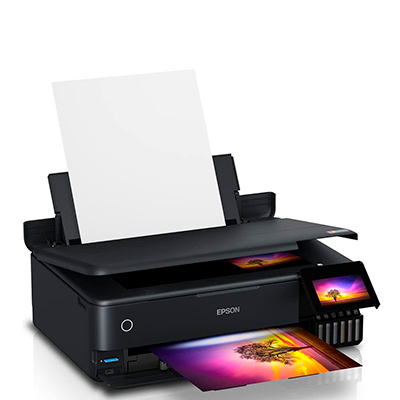
This A3+ printer is a great option for long-term savings. Instead of cartridges, it has ink tanks that you refill from bottles, potentially reducing running costs considerably.
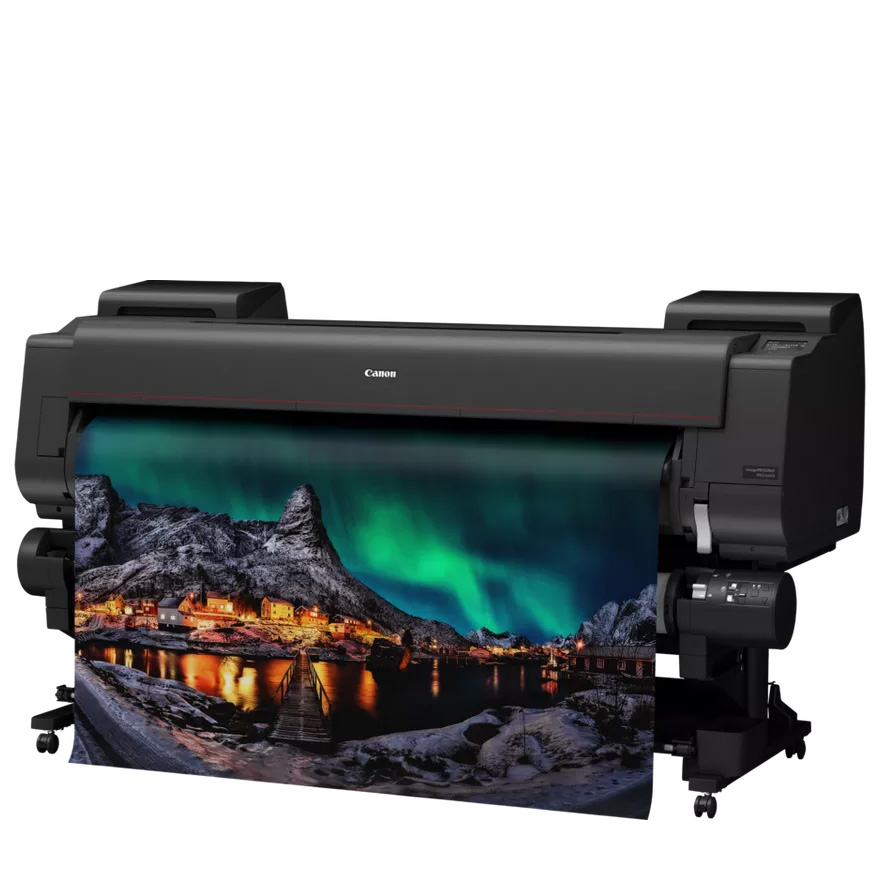
This wide-format printer is designed for mini labs and photo studios that need something that can provide both scale and volume. It prints photos up to 60 inches in width and with ink claimed to be color-fast for 200 years.
The best large format printer
Why you can trust Digital Camera World
The best large format printer overall
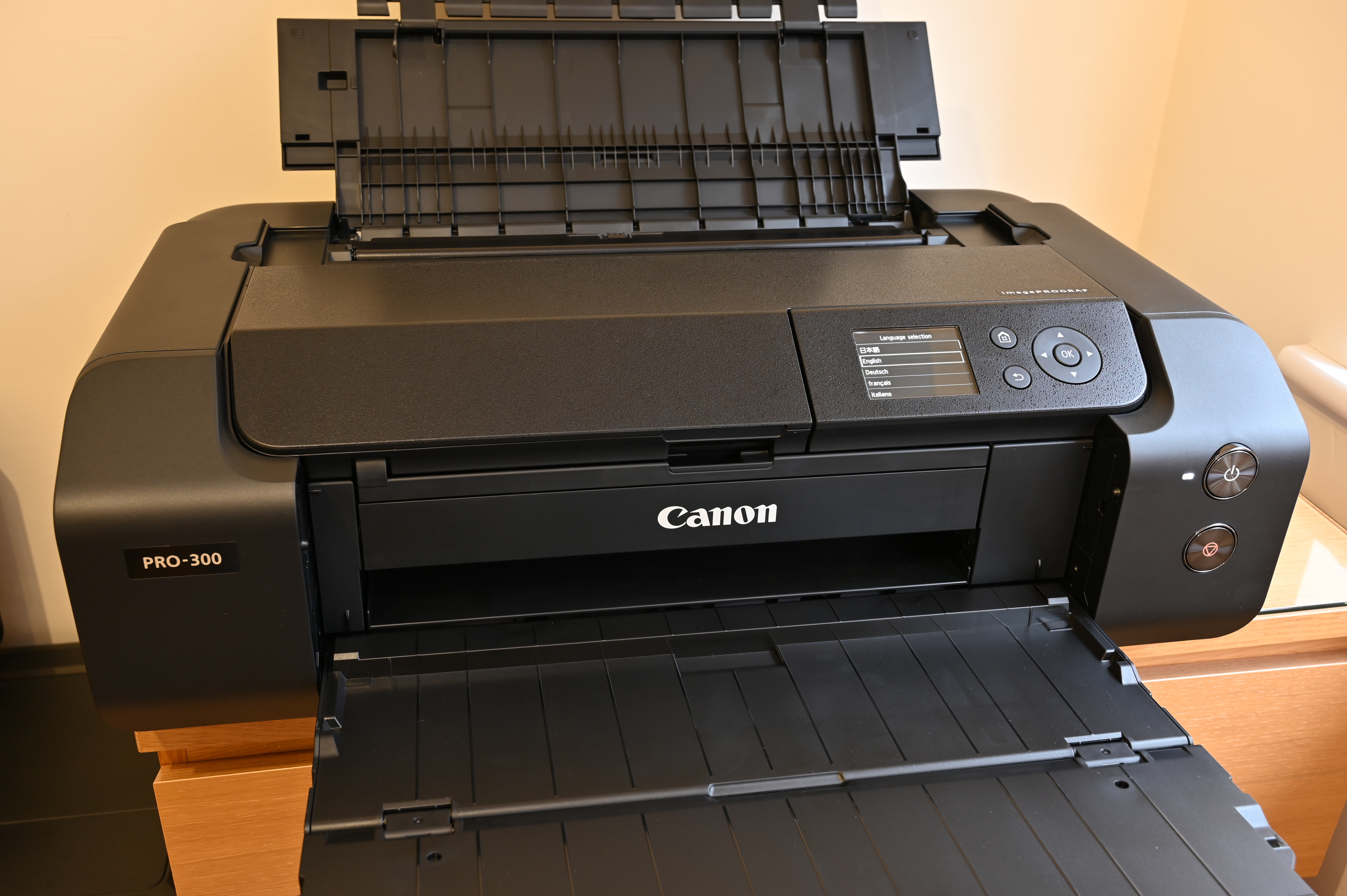
Specifications
Reasons to buy
Reasons to avoid
The Canon PRO-300 is the successor to the highly-regarded PRO-10. Like its predecessor, its distinguishing feature is that it uses ten pigment inks rather than dye-based ink. One of the cartridges is a ‘Chroma Optimizer’, which provides a smooth finish on glossy paper. The other nine are Lucia Pro inks, providing the standard six colors for photo printing, plus red and grey inks, and both ‘photo’ black and matte black, for printing on glossy and matte media respectively.
There are individual channels in the print head for both photo and matte black inks, which saves time and ink when swapping between media types. In our testing, we were impressed with the excellent output quality, finding superb accuracy in color prints and fabulous definition for black & white photo prints, without any unwanted color casts.
Read our full Canon imagePROGRAF PRO-300 review for more details
The best value large format printer
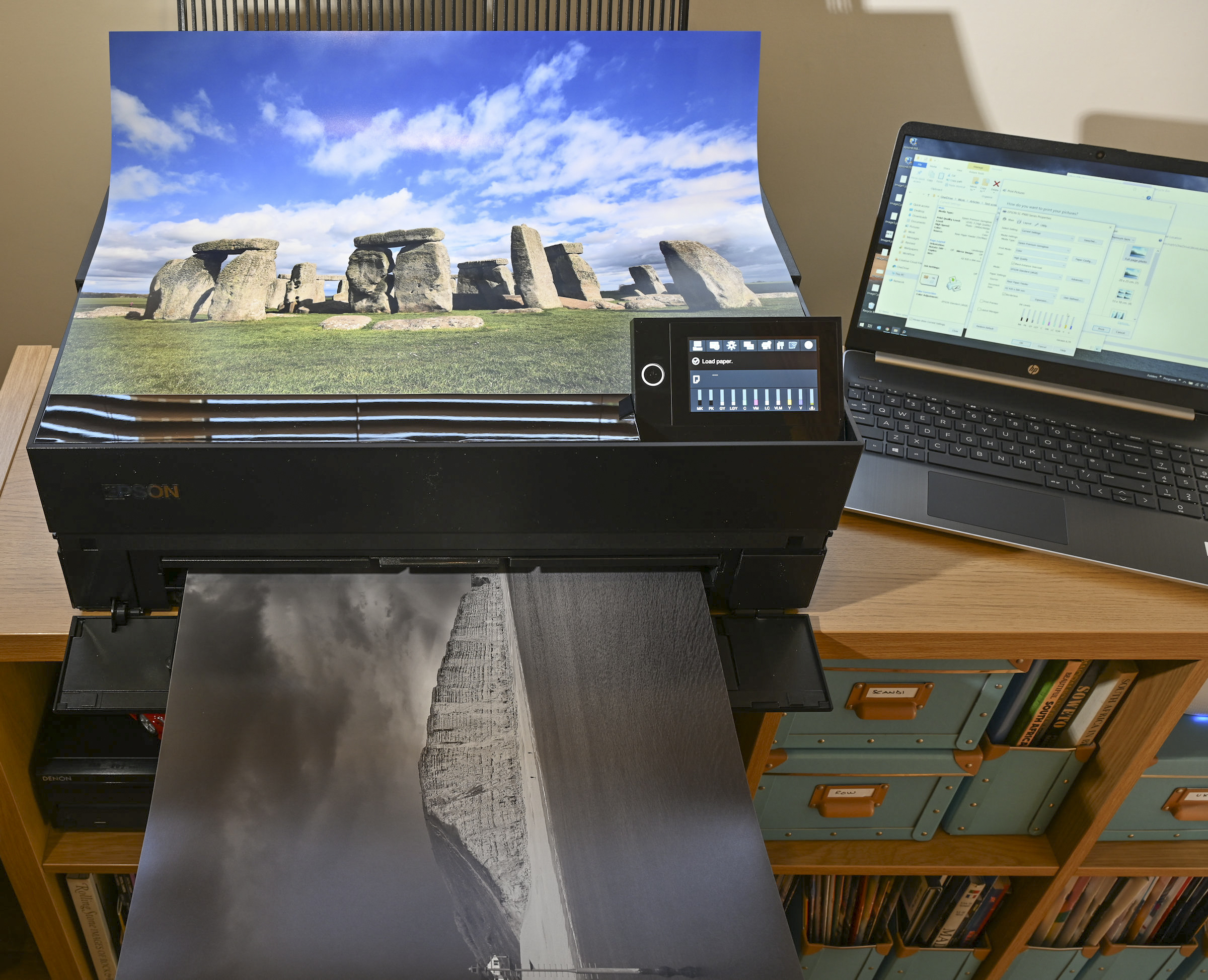
Specifications
Reasons to buy
Reasons to avoid
Can’t decide whether you need a sheet or roll printer? The Epson SureColor SC-P900 provides a choice of both – although you do have to pay extra to get the roller unit. And Epson’s flexible flagship A2 printer is capable of printing up to 17 inches in width.
This is an update of the older Epson SureColor P800, offering a significant improvement in image quality, with deep contrasty blacks and rich tones thanks to an additional, tenth, ink. We found that the three paper paths, including a front-loading one for fine art paper, made it easy to switch between different formats – and the roll paper option is great to have for panoramic prints.
There’s onboard Wi-Fi for printing from smartphones or cameras directly, and a 4.3-inch touch panel screen for making selections. The 80ml cartridge size is fairly generous. All in all, a relatively compact footprint and accessible price, plus the flexibility this machine provides, make this a great buy.
Read our full Epson SureColor SC-P900 review for more details
A smaller A3+, 13-inch, version of this printer - the Epson SureColor SC-P700 - is also available.
The best heavy-duty large format printer
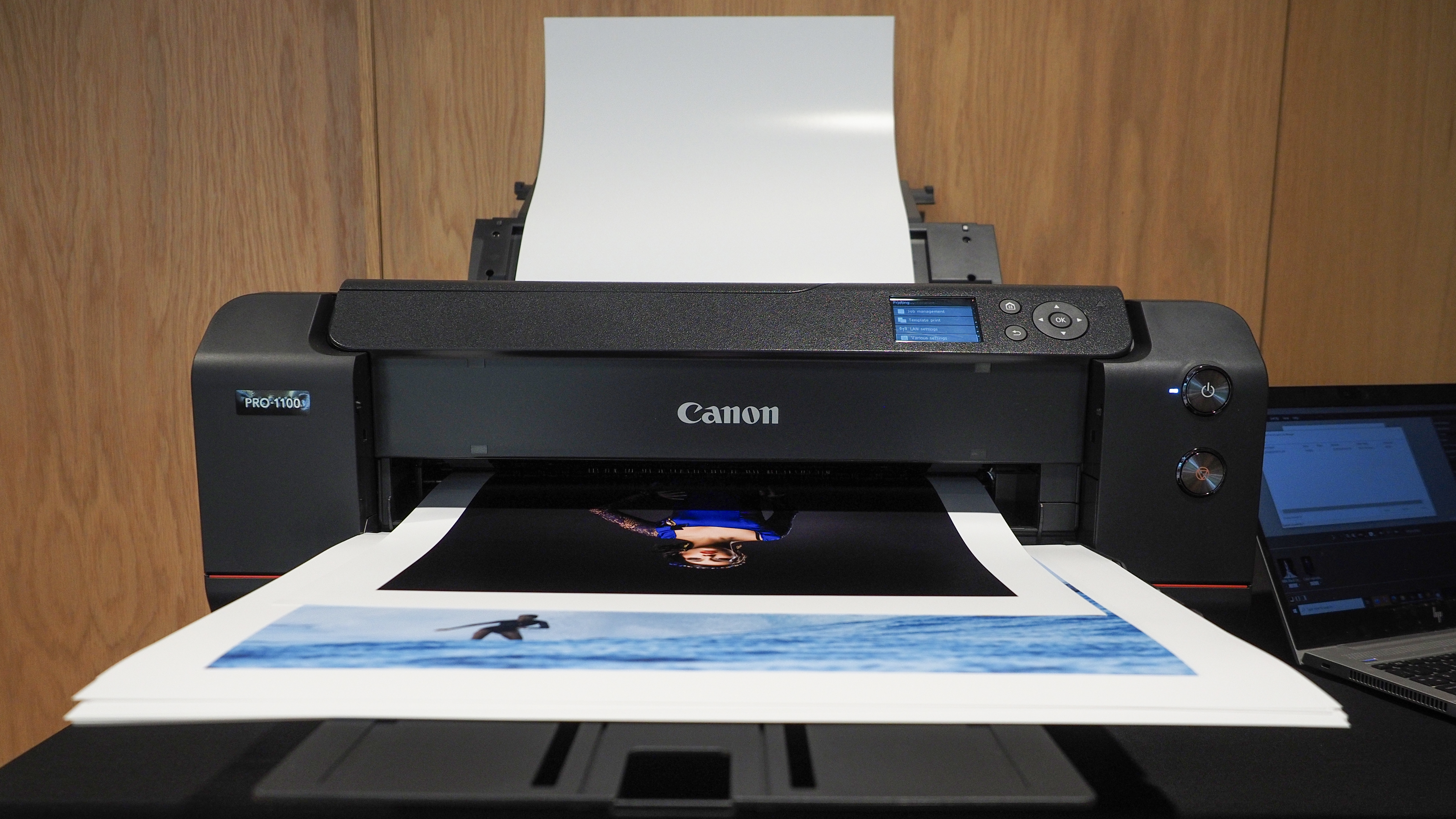
Specifications
Reasons to buy
Reasons to avoid
Like Canon’s L-series camera lenses, the PRO-1100 printer has a ‘red line’ on it denoting superior quality aimed at professionals. It packs 12 pigment-based Lucia Pro II ink cartridges, compared to the 10 inks for the PRO-300 at the top of our list. We found blacks to be richer and deeper as a result - improving on the already-stunning results that we got from its predecessor, the PRO-1000.
The chroma optimizer helps to apply a smooth top coating when printing on glossy photo paper to minimize bronzing and gloss differential. Even so, the printer achieves its highest quality with matte and fine art media, on which color and mono output are truly magnificent. The A2/17x22-inch prints are certainly imposing, and you can create panoramic prints of up to 1.2m in length, although there’s no optional roll-feeder so you have to cut the paper to length manually in advance. The biggest downside, of course, is the price.
Read our full Canon imagePROGRAF PRO-1100 review for more details
The best budget large format printer
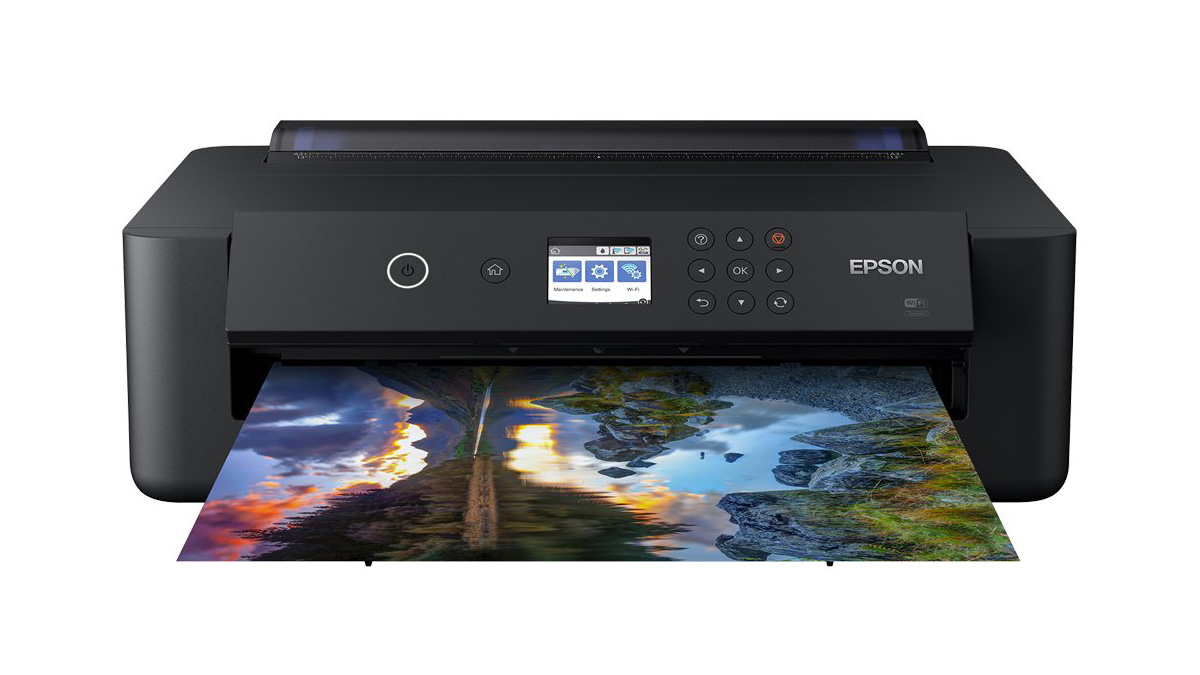
4. Epson Expression Photo HD XP-15000
Our expert review:
Specifications
Reasons to buy
Reasons to avoid
If you need to go large on a budget, we recommend the Expression Photo HD XP-15000. This is an entry-level 13-inch / A3+ printer that's more for a back bedroom than a pro studio, but we found it to be reliable while also coming in at a practical size for home use.
The initial outlay is relatively low. Inevitably, that means some sacrifices, and there are only six inks here compared to 10 or even 12 in some of the other large format printers we reviewed. We found the large LCD screen easy to adjust settings on and a suite of mobile printing apps enable you to take advantage of the printer's wireless capabilities. While the front-loading tray handles A4 or US Letter paper, the rear paper feed is suitable for A3+ prints, including use of thicker media.
The best large format printer for economical running costs
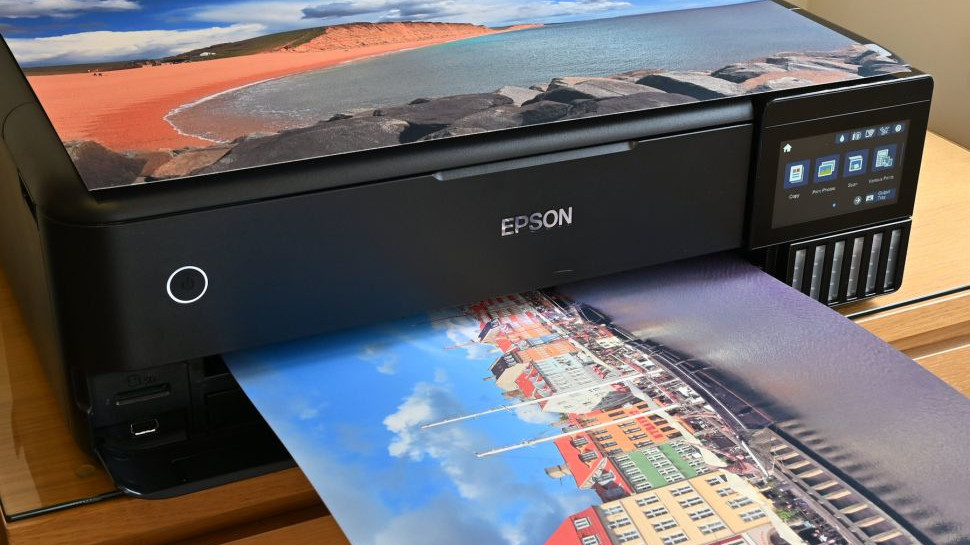
Specifications
Reasons to buy
Reasons to avoid
The Epson EcoTank ET-8550 is different from most dedicated A3+/13x19-inch inkjet photo printers as it is much more of a multi-function device. In fact, we also included it in our pick of the best all-in-one printers.
Specialist photo printers often have a significantly wider color gamut, with eight or more different inks. this has only six, but we found the combination of pigment-based black ink for crisp black text and dye-based inks for color produced good results on the whole. Where the ET-8550 comes into its own is that it has ink tanks rather than cartridges. These are replenished via 70ml bottles, at a cost of around $17.50/£16 each, which makes this most cost-effective in the long run.
Epson says that the ink cost is therefore reduced by around 80 percent overall. The flip side is that the ET-8550 costs nearly three times as much to buy in the first place when compared to a conventional A3+ printer in the same class.
Read our full Epson EcoTank ET-8550 review for more details
The best large format printer for volume
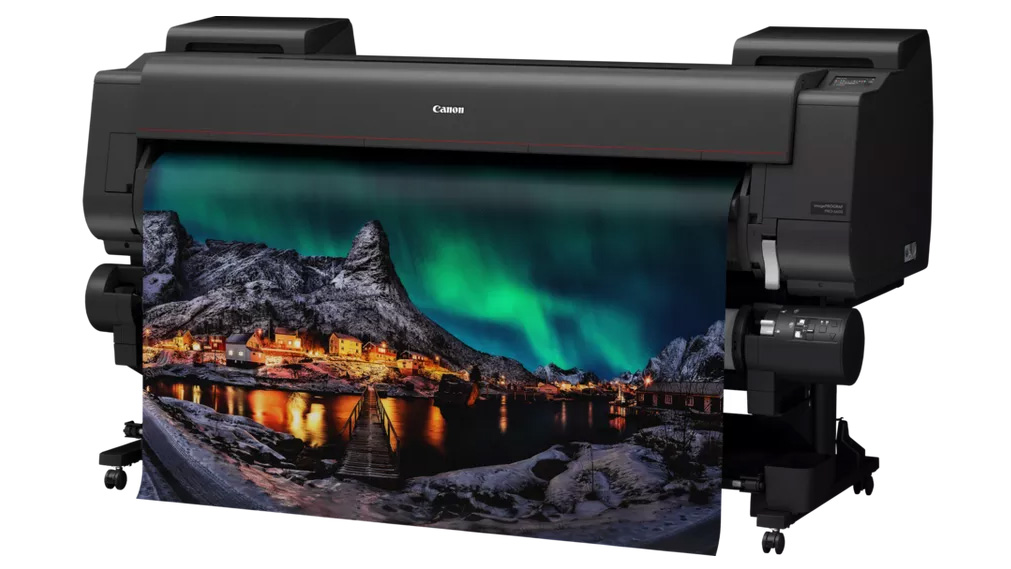
6. Canon imagePROGRAF PRO-6600
Our expert review:
Specifications
Reasons to buy
Reasons to avoid
This wide format printer is designed for mini labs and photo studios needing something that can handle both scale and a high volume of output. With the ability to print at up to 60 inches wide, there’s a lot of versatility built in here: as well as printing photographs at exhibition quality with 12 pigment inks (7 of them color), the size means this printer can also produce signage and banners.
The print head offers prints to a maximum 2400 x 1200dpi resolution, with a Chroma Optimiser cartridge to enhance dark density and produce deeper blacks. Canon also claims its ink is scratch resistant, with high light-resistance that keeps it color-fast for 200 years.
The downside is the imagePROGRAF PRO-6600 doesn't fit on a desk by any means, so you'll need space for it. Oh, and it costs as much as many cars!
The best 24-inch large format printer
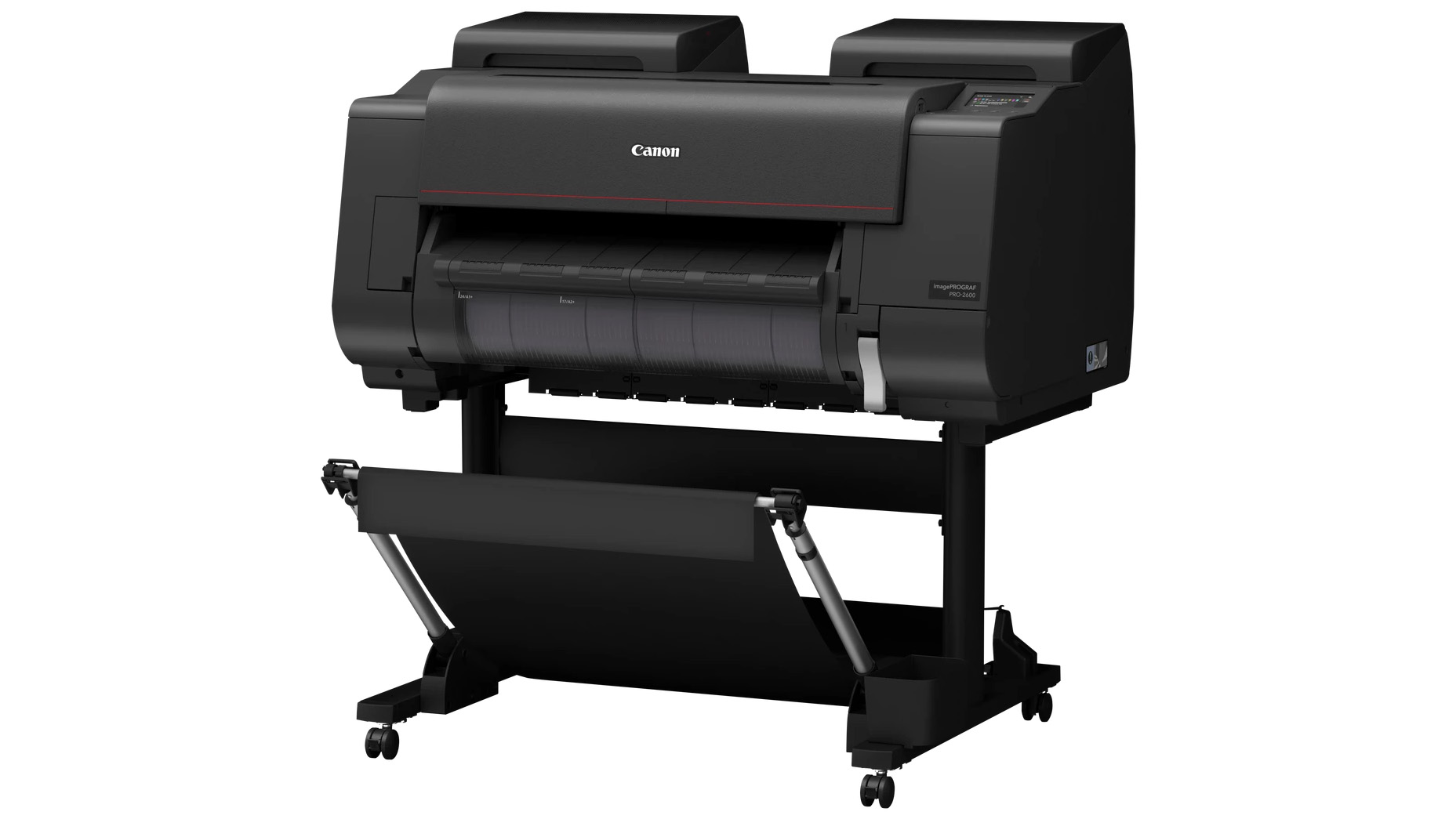
7. Canon imagePROGRAF PRO-2600
Our expert review:
Specifications
Reasons to buy
Reasons to avoid
We've already mentioned Canon’s A3+/13-inch imagePROGRAF PRO-300 and the A2/17-inch PRO-1000. These both deliver gallery-quality photo and fine art prints from conveniently compact desktop machines. Now, take that quality up to a grander scale, and you have the imagePROGRAF PRO-2600, a much larger, freestanding printer that takes rolls of paper up to 24 inches in width.
We've tested this printer's direct predecessor, the PRO-2100, and found it delivered spectacular print quality for both color and mono photographic images, based on a range of 12 Lucia Pro pigment-based inks that includes that chroma optimizer we've already mentioned.
There's support for a huge range of fine art media from the world’s best paper companies like Canson and Hahnemühle. We like the auto paper cutter and Canon’s supporting Professional Print & Layout software makes the whole process quick and easy when creating bordered or borderless prints in custom sizes.
If you find a 24-inch print width to still be restrictive, the imagePROGRAF PRO-4600 and imagePROGRAF PRO-6600 are even larger and use the same ink cartridges and print heads for 44-inch and 60-inch print widths respectively.
The best plotter for studios
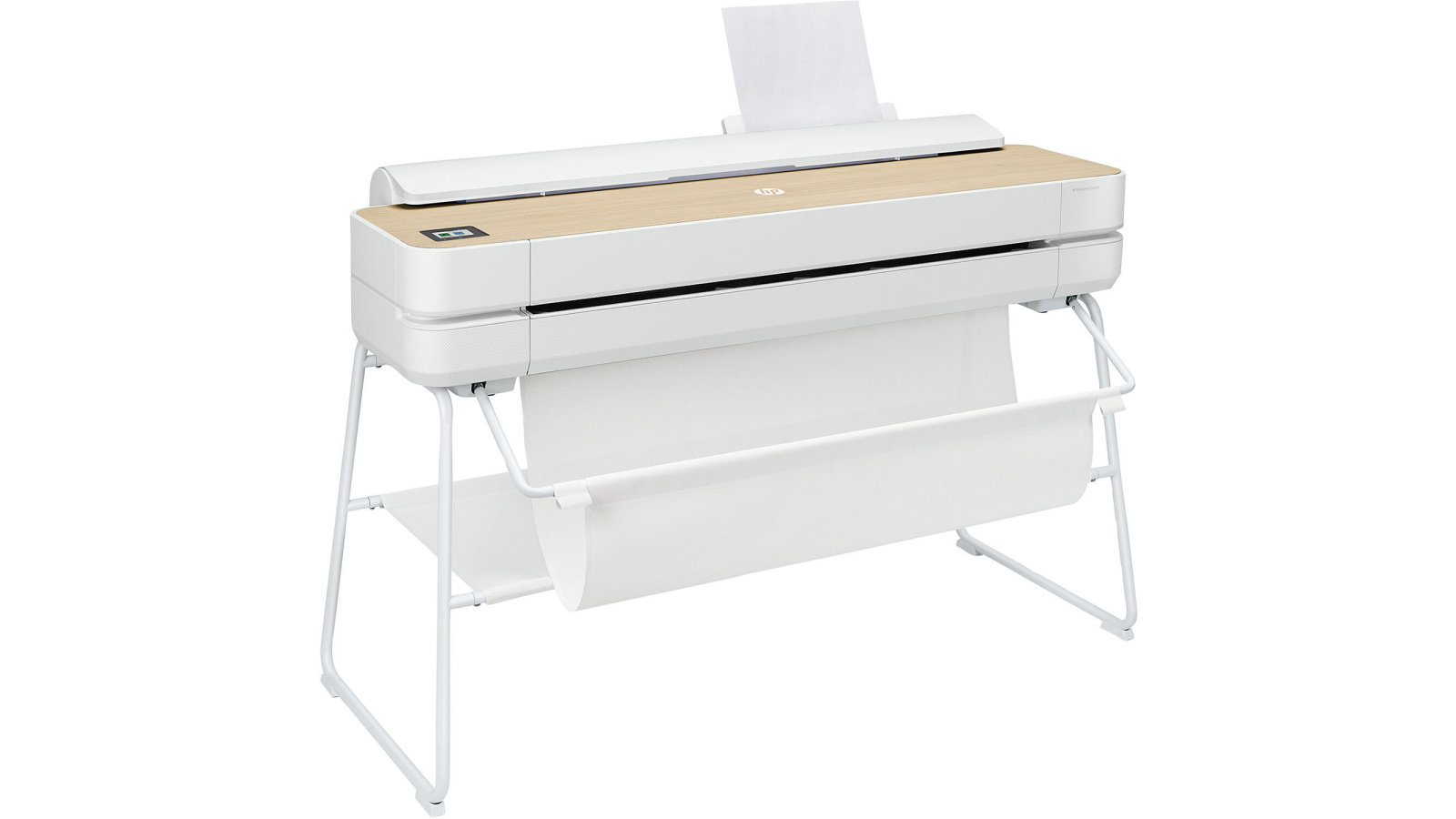
8. HP DesignJet Studio
Our expert review:
Specifications
Reasons to buy
Reasons to avoid
Think printing about paper and eco-friendliness might not be the first thing that springs to mind when choosing the best large format printer, but this has the bonus of being HP’s first carbon-neutral DesignJet plotter. Using recycled materials and low/renewable energy construction processes, it's available in ‘Steel’ or ‘Wood’ editions with alternative top panel finishes that complement the white build.
We think this is a sleek and stylish plotter that would look great in a studio. And it's practical to use too. You can set it up and run it from a smartphone, using HP’s companion app, and print on various sizes of paper using the automatic cut sheet and roll feeders, without having to continually change the media in the machine.
The ink set is relatively basic, combining a pigment-based black ink cartridge with dye-based cyan, magenta, and yellow cartridges. Naturally, a plotter like this can’t compete with specialist large-format photo printers for photographic quality, but we found that performed well for mono and color documents and general office plotting.
How to choose the best large format printer
The best large format printer for you will depend on just how big you want to go. For many enthusiasts working from home, printing images at A3 will be sufficiently rewarding. The size of print from a 13-inch printer is large enough to make an impact on a wall while still being reasonably affordable, and these printers are still desktop printers, which makes them more practical if you have limited space.
However, if you want to print at a size that will really make an impact in a larger room, you can go much larger, and we've reviewed printers that can produce prints as large as 64 inches. These larger printers are free-standing so you need the space to be able to accommodate them. They're also very expensive. However, they print on rolls rather than sheets, which can be beneficial for printing large volumes.
Of course, buying a printer isn’t a one-off investment, as you'll need to buy good quality inks and paper too. Consider the type of ink a printer uses when making your purchase decision, as this will directly influence the running costs. While it is possible to buy third-party inks to refill printers, we generally advise using the official refills to ensure maximum quality because every part of the system is developed, designed, and honed to work together.
How we tested the best large format printers
As you can, printers come in so many shapes and sizes, from pocket photo printers to large-format professional models. This is to reflect the wide range of photographers and customers – while some might want to print greetings cards, others will be printing premium prints for high-end clients.
We check the suitability of models for wide-ranging tasks, from printing office documents to high-end photographic output and, consequently, the type and quantity of dye/pigment inks. Additional features can include a built-in scanner, a standalone control panel, touchscreen interface, Wi-Fi connectivity, direct fax functions and connectivity specs such as a card reader slot.
Our test procedure begins with installing the latest software drivers and running nozzle check and print head alignment routines. We then create test prints from mono documents, mixed text and graphics color documents, and a wide range of digital photos that include landscapes, portraits, and black & white images.
During testing we also make sure to try out the various available quality modes, including optional image enhancement features. We create prints from our own specially created test chart to test the printer's accuracy in terms of color reproduction, tonal range, retention of detail in bright highlights and dark shadows, and the ability to deliver smooth gradations in subtle color variations. The printer manufacturer’s own-brand inks and papers are used throughout the entire testing procedure.
For output speed, we record the time taken to produce various sizes of prints at different quality settings. Ink costs are calculated on typical page yield against average prices for the manufacturer’s own-brand cartridges or bottles.
FAQs
What is a large format printer?
While the definition can vary, large format printers are generally considered to be any printer that supports a print width wider than A4/Letter size paper, starting from A3 and going much larger. Within large format printing, there is the more specific term 'wide format printer', which is generally considered to refer to any printer that supports a print width of between 18 and 100 inches (460 and 2,540mm). Printers that can handle even wider print rolls are known as super-wide or grand format.
How are maximum print sizes measured?
In the US, the maximum paper size is possible is described using the maximum widt that the printer's head can stretch to. For large format printers, therefore 13in and 17in widths are the most common - but with more specialist printers being able to go wider. In the UK and Europe, the maximum size is usually described using standard European paper sizes - so for large-format printers that is A3 or bigger. An 13in printer is therefore the same as an A3+ printer. In the table below you can see the dimensions of common large-format print sizes…
Name | Millimetres | Inches |
|---|---|---|
A0 | 841 x 1189 mm | 33.1 x 46.8 in |
A1 | 594 x 841 mm | 23.4 x 33.1 in |
A2+ | 432 x 610 mm | 17 x 24 in |
A2 | 420 x 594 mm | 16.5 x 23.4 in |
A3+ | 329 x 483 mm | 13 x 19 in |
A3 | 297 x 420 mm | 11.7 x 16.5 in |
What are large format printers used for?
Large format printers are used for anything that needs to be printed at a size larger than that provided by a standard printer. That can include photos, with large format printers being ideal for fine art prints, as well as posters, banners, wallpaper, duratrans, architectural drawings and signage.
Do I need a large format printer?
It depends on what you will use it for and on your budget. If you're an enthusiast photographer and you plan to produce large format prints of your work only occasionally, it may be most cost effective to entrust the job to a print shop. However, if you're planning to exhibit or to go into business selling prints at large sizes, having your own large format printer may save you money in the long run. Having your own printer also gives you more direct control over the process.
Also see our guide to the best photo papers for inkjet printers
Get the Digital Camera World Newsletter
The best camera deals, reviews, product advice, and unmissable photography news, direct to your inbox!
Matthew Richards is a photographer and journalist who has spent years using and reviewing all manner of photo gear. He is Digital Camera World's principal lens reviewer – and has tested more primes and zooms than most people have had hot dinners!
His expertise with equipment doesn’t end there, though. He is also an encyclopedia when it comes to all manner of cameras, camera holsters and bags, flashguns, tripods and heads, printers, papers and inks, and just about anything imaging-related.
In an earlier life he was a broadcast engineer at the BBC, as well as a former editor of PC Guide.
